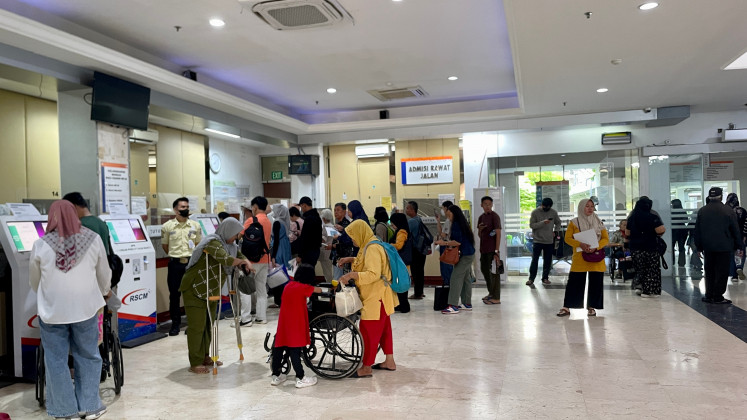Popular Reads
Top Results
Can't find what you're looking for?
View all search resultsPopular Reads
Top Results
Can't find what you're looking for?
View all search resultsWhy the ‘new normal’ is not so new for banks
The report said that a strong mobile banking offering had become a minimum requirement for competitiveness in the industry.
Change text size
Gift Premium Articles
to Anyone
T
he current COVID-19 situation has encouraged individuals and businesses to embrace a new reality dubbed the “new normal” with many strings attached, which has necessitated a drastic transition to daily life.
Almost all aspect of daily life has been altered with physical distancing measures meant to prevent the spread of the disease. This means what was once considered a daily chore or activity, such as commuting to our offices and visiting the mall, have now become less frequent routines.
People now spend more time in video conference sessions and scrolling various e-commerce sites to look for the best deals and promotions to minimize physical interaction with others.
The new normal is not something that is entirely foreign for the front-end business process of the financial services industry. A report by the Boston Consulting Group (BCG) dating back to 2012 has used the term “new normal” to describe changing trends in retail banking, which is very much relevant with the social and physical distancing measures in place as a result of COVID-19.
The report said that a strong mobile banking offering had become a minimum requirement for competitiveness in the industry. Specifically, online channels would be the primary channel for high-volume banking activities such as balance and statement viewing as well as transfers of funds between accounts. These channels enable the customer to have minimal or no physical interaction to receive and use banking services.
The banking industry since then has largely followed the BCG’s prediction. Banks have reduced their physical branch footprints in recent years due to changing consumer behavior. Based on data from the Financial Services Authority (OJK), the number of physical bank branches has seen a declining trend from nearly 33,000 branches in 2015 to just over 31,000 in 2019. Banks have aggressively digitized their operations to go beyond mobile and internet banking apps.
For example, PT Bank Central Asia (BCA), the nation’s largest private lender, recently launched its digital-only banking subsidiary, while banks such as DBS and BTPN have launched digital-only banking account products. The Home Ministry’s online population and civil registry system has made it possible for banks and other financial institutions to conduct the Know Your Customer (KYC) process online without any physical interactions.
To provide banking services digitally, the OJK also began supporting banks by issuing a regulation on the provision of digital banking services in 2018.
The COVID-19 pandemic should assist in accelerating this digital transformation, and government regulations mandating physical distancing should have little effect. It should mostly be business as usual rather than the “new normal” for consumer banking activities in the post-COVID-19 society.
The adjustment to the new normal, though, will more likely be felt in the back-office functions of financial institutions. Prior to COVID-19, remote working was not an option for most back-office operations. Remote working was deemed very risky for a highly regulated industry such as banking. It would add difficulties in complying with specific regulatory requirements and introduces banks to IT and cyber risks in the business process, which may go beyond banks’ risk appetite. COVID-19, though, has required banks to adapt to remote working conditions.
According to an article published in the Financial Times, employees working in European investment banks have now become accustomed to working from makeshift trading desks at their respective homes. This is a departure from their daily routines, in which they were required to be present at their office desks as early as 6:45 a.m.
Although traders in Europe initially struggled to adapt to the new conditions, as the number of failed trades across equities and bonds significantly increased, some banks have gotten used to them and are now considering to permanently divide work between the office and home.
Barclays CEO Jes Staley was quoted in April as saying that putting 7,000 people in a building in London’s financial district may be a thing of the past. Though it has not affected the delivery of digital financial services to retail customers, the COVID-19 pandemic also has forced banks to be creative in developing some of their business continuity plans and maintain their operational resiliency.
Although the new normal might not be revolutionary for banks, vigilance toward certain risks must be done in order for banks to ensure business continuity. Remote working could possibly lead to an increase in IT risks, which also include cyber risks. The European Central Bank (ECB) has advised banks to proactively assess and test the capacity of their existing IT infrastructure in anticipating a potential increase in cyberattacks and greater reliance on remote banking services during the pandemic.
In addition to cyber risks, another IT and remote working-related issue would be whether electronic or digital signatures are as legally valid as wet signatures. For Indonesia, this would not be a hurdle as the Electronic Information and Transactions (ITE) Law states that electronic signatures can be used as a tool for authentication and verification. Moreover, another challenge would be allocating resources efficiently amid this pandemic.
The “reprioritization” of some work is necessary to achieve this aim, in which regulators play a crucial role. In the United Kingdom, financial regulators have announced the postponement of nearly two-thirds of initiatives planned for 2021 as a plan to be aligned with the financial sector’s priorities and resources. Global financial regulators that are members of the Basel Committee on Banking Supervision have also agreed to delay the implementation date of some banking standards to allow banks and supervisors “to commit their full resources to responding to the impact of C0VID-19 to ensure that the banking system remains financially and operationally resilient”.
***
The writer is analyst at the Banking Research and Regulation Department of the Indonesian Financial Services Authority (OJK). The views expressed are his own.









